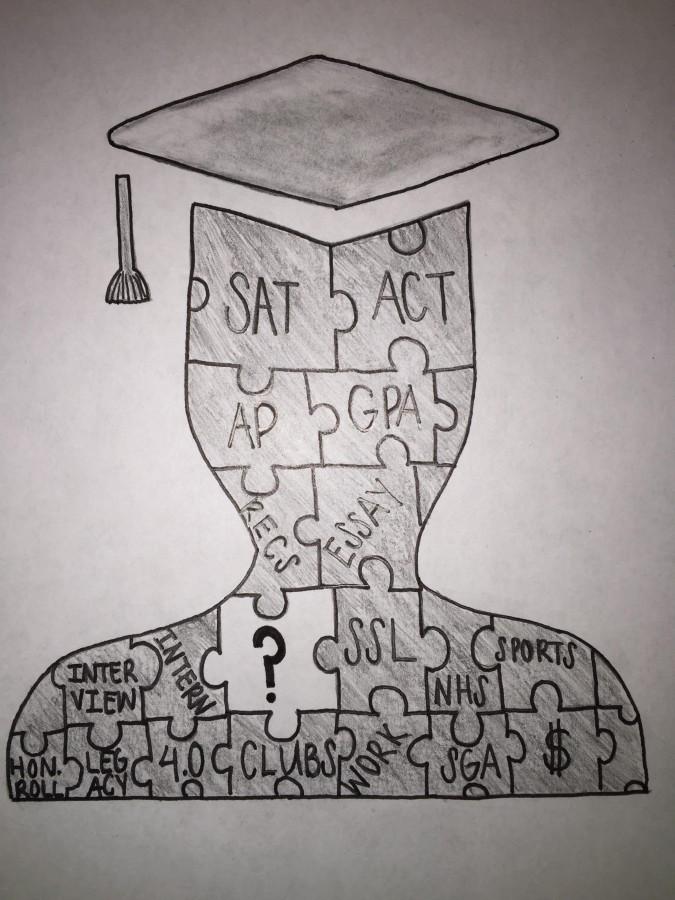Focusing on Character Won’t Lead to More Compassion
A new college admissions movement, led by Harvard, seeks to emphasize applicants’ character as much as other qualities.
February 25, 2016
College admissions officers face a daunting task: they must take piles of paper and weave them into a qualified, enthusiastic and cohesive student body, a group of students who will band together and change the world. As admissions officers sift through applications, they look for individuals with a personality that will benefit the university, but how do SAT scores, GPAs and one 500-word personal essay entitled The Trip That Changed My Life offer a glimpse into what kind of a person each student is?
A change is much needed in the college application process and the focus needs to be taken off the pressure-inducing standardized tests and AP classes. However, these proposed changes cannot prevent the cut-throat competition that is still present in the application process.
According to the Harvard Graduate School of Education’s project Making Caring Common, the answer seems to lie in their movement, Turning the Tide: Inspiring Concern For Others And The Common Good Through College Admissions, which seeks to encourage high school students to focus on meaningful involvement both intellectually and morally.
Colleges are looking to focus on character as well as credibility in academics in an effort to reward students who may not stand out in the current application process, but are truly good people.
According to the report, colleges should promote meaningful student service, assess students in a way that accounts for varying family and community contributions and redefine achievement in a way that both levels the playing field for all students and reduces “excessive achievement pressure.”
At first glance, these goals are admirable. It goes without saying that in order to create a student body equipped to better the world, college admissions officers need to select students who put service to others before themselves. Often, a student’s service can be overlooked when the student doesn’t receive outstanding recognition. With the ever-increasing pressure for students to create the perfect resume, students can feel trapped into creating an application that does not effectively reflect who they, but rather what they think admissions officers want to see, with service being one aspect that often gets falsified.
With the SSL system currently in place, students are already known to embellish their community service, exaggerating their importance in a cause they might have little passion for.
Once compassion is advertised, every student will try to embody it, which is a positive change for our community and for our world. However, character could become just another item that students feel they can exaggerate or modify in an application.
Perhaps the best way to gauge a student’s level of commitment to serving others is in a face-to-face interview. However, alumni interviews are already not offered at every college, and putting the interviewer in the position of “fact-checker” is hardly fair.
The Making Caring Common project is endorsed by 88 different admissions officers from a wide array of colleges, indicating that the schools are sensing a lack of passion and caring in their student bodies or that they simply need a change. Though requiring students to write an essay explaining an incident in which they are compassionate could help the school figure out whether the student is a kind person, it doesn’t help to give students more of an opportunity to foster a deep interest in something or create a passion for a certain service.
Many prospective college students know the system by now, and pad their resumes with an assortment of activities that they may have little interest in. Is shifting focus of the application process from the college’s perspective truly going to bring focus back into a student’s life?
Attempting to alleviate the students’ pressure for achievement is meant to allow students to grow as a person rather than as a set of statistics and test scores. But the changes to the college application process just direct students’ stress elsewhere. Not to mention, regardless of what sort of items a student must now put on his or her application, he or she will still be putting an application into a pool with thousands of others. The inherent competition cannot be avoided. Students will still want to do everything in their power to elevate themselves from others.
Though changing the idea of achievement from SAT scores and AP classes, two statistics that have linked achievement with socioeconomic status, low-income students will still face the issue of having less access to counseling and preparation. When it comes to actually going to college, a student who has taken harder classes will be more prepared, so regardless of whether it is “required,” students with the access to these classes and additional resources still have an advantage.
Also, eliminating the requirement for exceptional scores does not make these scores obsolete. Colleges are still looking for high-achieving students and students will do everything in their power to present a resume that reflects that.
A change is undoubtedly needed in the present college application. But we have a long way to go. The proposed modifications should be just a first step, not an end goal.


